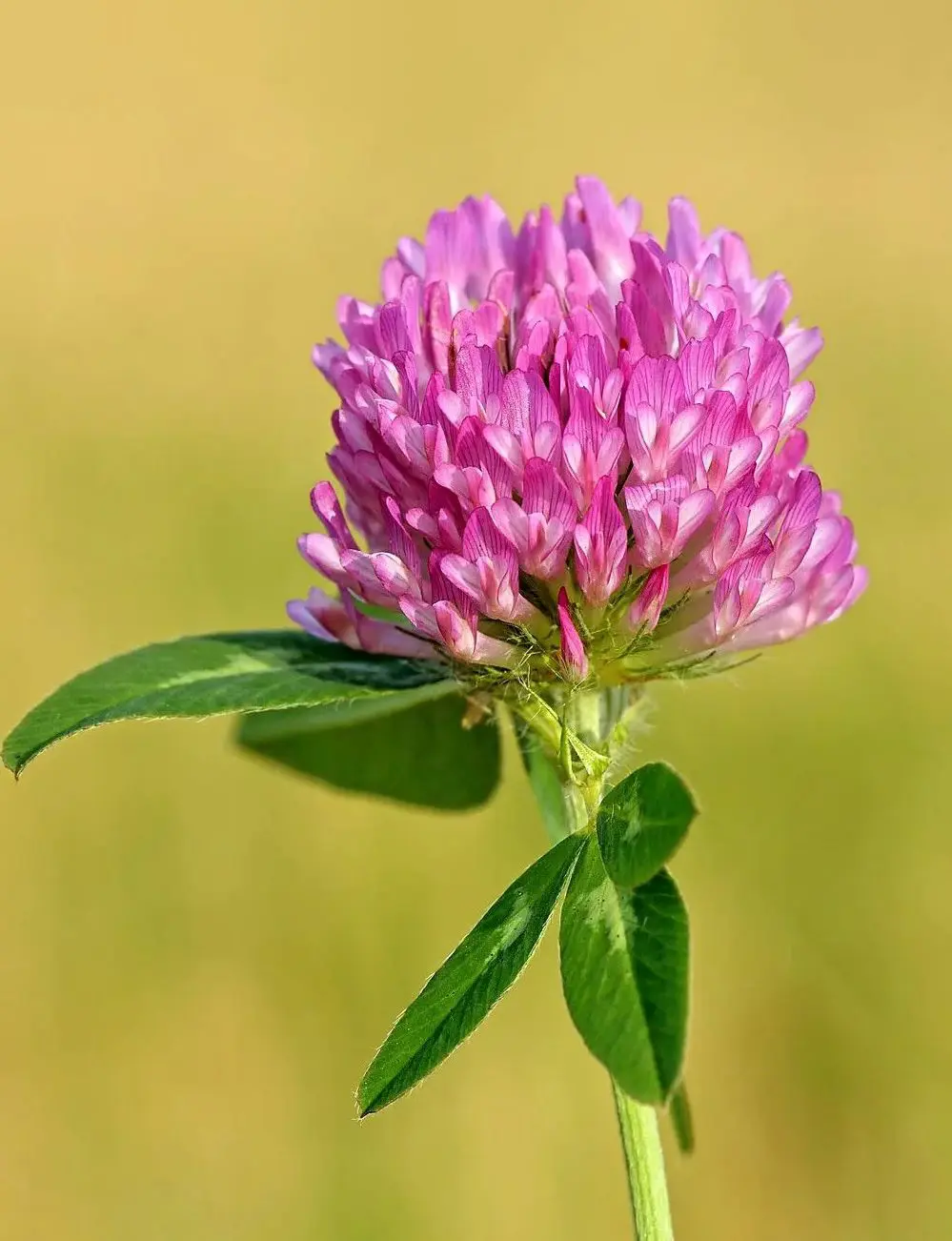19 Red Clover Health Benefits

Red clover (Trifolium pratense) is a perennial herb from the legume family, Fabaceae. Native to Europe, Western Asia, and Northwest Africa, it has now become widespread in various regions worldwide. The plant features trifoliate leaves and rounded, reddish-pink flower heads.
Abundant in isoflavones, vitamins, and minerals, red clover provides numerous health benefits and has been used in traditional medicine for centuries. It supports bone health, improves skin, aids digestive health, and much more. Here are 19 benefits of red clover.
1. Bone Health and Osteoporosis

Osteoporosis is a bone disease characterized by a decrease in bone density and mass. Women are more susceptible to developing osteoporosis due to the decline in estrogen levels during menopause. Red clover contains isoflavones, a type of phytoestrogen, which can weakly mimic estrogen in the body.
Some studies have suggested a link between isoflavone intake and reduced risk of osteoporosis. Additionally, older studies have reported improvements in bone mineral density (BMD) after taking red clover extract. However, due to the conflicting nature of existing research, further studies are necessary.
2. Help Reduce Menopausal Symptoms

As women enter menopause, their estrogen levels decline. Isoflavones found in red clover, which have estrogen-like effects, are believed to help reduce menopausal symptoms such as hot flashes and night sweats. The plant has also shown mild improvements in other menopausal symptoms, including anxiety, depression, and vaginal dryness.
Research on the efficacy of red clover for menopausal symptoms has been inconsistent. Some studies on a specific red clover isoflavone extract indicate a significant reduction in hot flashes, while other research shows no significant benefits.
3. Anti-Inflammatory Properties
Red clover contains various bioactive compounds, such as isoflavones, flavonoids, and coumarins, which contribute to its anti-inflammatory effects. These compounds help reduce inflammation in the body, making red clover potentially beneficial for conditions such as arthritis, skin inflammation, and other inflammatory disorders.
The anti-inflammatory properties of red clover also support its use in promoting overall health and wellness.
4. Good for Skin and Hair Health
In traditional medicine, red clover extract has been used to enhance the health of both skin and hair. Estrogen plays a direct role in skin health, and red clover aids in increasing collagen levels and improving moisture retention in the skin. Skin with elevated collagen levels tends to appear more youthful and supple.
During menopause, when estrogen levels become imbalanced, the skin may manifest as dry, wrinkled, and lackluster. In such instances, red clover phytoestrogens assist in the repair and regeneration of skin cells.
5. Promotes Heart Health

Some early studies suggest that red clover might benefit heart health in postmenopausal women. For example, a study from 2015 with 147 postmenopausal women found that taking 50 mg of red clover (Rimostil) daily for a year led to a 12% decrease in LDL (bad) cholesterol levels.
However, a 2020 review contradicted these findings, suggesting that red clover didn't have a significant effect on LDL (bad) or HDL (good) cholesterol levels. Despite these hopeful findings, the authors believe that many studies were too small and poorly conducted. Therefore, better research is needed to truly understand the effects.
6. Cancer Prevention

Researchers have initiated studies on the role of red clover isoflavones in preventing and treating cancer. Early research suggests that these isoflavones might have the ability to kill cancer cells in laboratory experiments or hinder their growth. Red clover might help prevent prostate and endometrial cancers.
However, because of its estrogen-like properties, there's a concern that it could also contribute to the development of certain malignancies, similar to estrogen. Until further research is conducted, doctors cannot recommend red clover as a preventative measure against cancer.
7. Boosts Immune System
Red clover contains various bioactive compounds, including isoflavones, flavonoids, and vitamins, which may contribute to its immunomodulatory effects. These compounds have antioxidant, anti-inflammatory, and antimicrobial properties that can help strengthen the body's defenses against infections and diseases.
Moreover, red clover may support immune function by promoting overall health, aiding in detoxification, and reducing oxidative stress. While research on red clover's impact on the immune system is ongoing, incorporating it into a balanced diet or as an herbal supplement may offer potential benefits for immune health.
8. Helps Lower Blood Pressure
Red clover may help reduce inflammation throughout the body, especially in the cardiovascular system. Several studies indicate that drinking red clover tea can significantly alleviate tension in arteries and blood vessels, potentially lowering blood pressure and reducing the risk of cardiovascular conditions such as coronary artery disease.
Brewing red clover into herbal tea is simple: just steep dried red clover flowers or leaves in hot water, and it can be enjoyed either hot or cold. Red clover supplements are also available in capsule or tablet form.
9. Weight Management

Drinking red clover tea has been linked to weight loss. In a study, individuals who consumed red clover tea twice daily for six weeks experienced greater body fat loss compared to those who didn't drink the tea. Researchers attribute this effect to the presence of polyphenols in red clover, which have been shown to boost metabolism and enhance fat burning.
Red clover tea is known to stimulate digestion and metabolism, aiding in more efficient fat breakdown. Consuming red clover tea can also improve energy levels, making exercise more manageable and enjoyable.
10. Respiratory Health

Red clover is believed to benefit respiratory health by soothing inflammation in the respiratory tract and acting as an expectorant. Compounds like flavonoids and isoflavones possess anti-inflammatory and antimicrobial properties, which can help alleviate symptoms of respiratory conditions such as asthma, bronchitis, and coughs.
The plant's expectorant effects help loosen mucus, making it easier to expel from the lungs and airways, promoting clearer breathing. Its antioxidant properties may also protect lung tissue from damage caused by oxidative stress.
11. Digestive Health
Red clover is thought to promote digestive health due to its anti-inflammatory and antioxidant properties. These properties help soothe inflammation in the digestive tract and protect against oxidative damage.
Further, red clover may aid digestion by promoting the secretion of digestive enzymes and enhancing gut motility, thereby improving nutrient absorption and preventing digestive issues such as bloating and constipation. Its antimicrobial properties may also help combat harmful bacteria in the gut, supporting overall digestive wellness.
12. Blood Sugar Regulation

Red clover may help lower blood sugar, particularly for younger adults. Studies suggest it achieves this by improving insulin sensitivity and reducing insulin levels.
More research is needed to confirm these effects in humans.
If you have diabetes, consult your doctor before using red clover as it might interact with medications.
13. Promotes Cardiovascular Health
The potential benefits of red clover for cardiovascular health are linked to several mechanisms, but the research is still developing. Some studies suggest red clover may improve arterial compliance, meaning arteries become more flexible and relaxed, potentially reducing blood pressure and heart strain.
Some research shows an increase in "good" HDL cholesterol and a decrease in "bad" LDL cholesterol in postmenopausal women taking red clover. Red clover may also have blood-thinning properties, which could help prevent blood clots from forming and improve circulation.
14. Mood Enhancement

Red clover shows promise in improving mood, particularly for women experiencing hormonal fluctuations. During menopause or PMS, when estrogen levels decline, isoflavones present in red clover may bind to estrogen receptors and help regulate mood swings and anxiety.
Studies suggest this approach might be effective. For instance, a study observed a significant decrease in anxiety and depression scores in menopausal women taking red clover compared to a placebo. However, more research is needed to solidify this link.
15. Anti-aging Properties
Red clover contains isoflavones, which may mimic estrogen. Estrogen helps maintain skin thickness, moisture, and collagen production. Studies suggest red clover extract might improve skin health and reduce wrinkles in postmenopausal women.
Similar to its effect on the skin, red clover's isoflavones might help maintain bone density, potentially reducing the risk of osteoporosis, a condition common with aging, especially after menopause. Overall, the flowering plant shows promise for anti-aging benefits, particularly related to skin and bone health.
16. Hormonal Balance
During menopause and perimenopause, estrogen levels naturally decline. Red clover's isoflavones can bind to estrogen receptors, potentially helping regulate mood swings, hot flashes, and other symptoms associated with these hormonal shifts.
Similarly, PMS involves hormonal fluctuations, and isoflavones from red clover might provide some relief from bloating, cramps, and irritability by interacting with these same receptors. While some studies show promise, more research is needed to definitively confirm red clover's effectiveness for hormonal balance.
17. Cognitive Health

Estrogen plays a potential role in cognitive function, particularly in women. Red clover's isoflavones might theoretically help maintain or improve cognitive function by interacting with estrogen receptors in the brain. Some studies, especially those in postmenopausal women, have shown promising results.
For example, improvements in memory, focus, and verbal fluency have been observed in women taking red clover compared to a placebo. However, these findings haven't always been consistent, making it difficult to draw definitive conclusions about red clover's benefits for cognitive health.
18. Detoxification
There is a traditional belief that red clover aids in detoxification. Traditional use suggests that red clover might act as a diuretic, increasing urination and potentially helping to remove toxins. Traditional practices sometimes associate red clover with supporting the liver and lymphatic system, which play essential roles in detoxification.
Overall, while red clover might have some properties that align with the idea of detoxification, there is no strong scientific backing for its effectiveness in this area.
19. Wound Healing

Red clover has been traditionally used for various purposes, including wound healing, due to its potential anti-inflammatory and antimicrobial properties. Some anecdotal evidence and historical use suggest red clover may aid in wound healing, particularly when applied topically as a poultice or ointment.
While some studies have explored its potential benefits, more rigorous scientific research is needed to determine its effectiveness and safety for wound healing. If you're considering using red clover for wound healing, consulting a healthcare professional is recommended.
Potential Side Effects
While red clover is generally considered safe for most people when used in moderation, it can have some potential side effects and interactions, particularly when consumed in large amounts or used long-term. Here are some possible side effects:
Digestive Issues
- Nausea: Some people might experience nausea, particularly when taking red clover supplements.
- Bloating and Gas: Red clover can cause digestive discomfort in some individuals.
Allergic Reactions
- Skin Reactions: Some people might develop skin rashes or other allergic reactions.
- Respiratory Issues: In rare cases, red clover can cause respiratory allergic reactions.
Pregnancy and Breastfeeding
- Not Recommended: Due to its estrogen-like effects, red clover is generally not recommended for pregnant or breastfeeding women.
Interaction with Medications
- Hormone Replacement Therapy (HRT): Red clover might interact with HRT or birth control pills.
- Blood Thinners: As mentioned, it can interact with anticoagulant medications, increasing the risk of bleeding.
- Other Medications: Red clover may interact with other medications, so it’s important to consult a healthcare provider before using it, especially if you are on other medications.
Recent posts
Nutrition
Nutrition
Licorice Root: Benefits And Uses
You can spell it liquorice or licorice; this herb or root has been in use for centuries in most medicinal applications, as a natural sweetener and to enhance flavors. Regarding its origins, it comes from the root of the "Glycyrrhiza galbre" plant and...
Nutrition
Is Salmon Good For You? Nutritional Facts and Benefits
Salmon fish is a staple diet throughout the world, popular as a super food for its nutrients. Whether savored in sushi, poached, grilled, roasted, or pan-fried, salmon offers minerals and vitamins that contribute to healthy bodily functions. In addit...
Nutrition
25 Smoked Salmon Recipes That You Will Enjoy
Salmon is a silver-colored fish that is loaded with many nutrients, vitamins, and omega-3 fatty acids. Smoked Salmon is better for improving your health and reducing the risk of cancer, heart-related diseases, fights inflammation, reduces anxiety and...
Nutrition
Are Sausages Healthy? Nutrition And Health Benefits
Sausages are tasty in an addictive way, making them one of the most popular foods worldwide. You may have enjoyed this convenient food often, whether on a bun with mustard or grilled on a barbecue, the simple preparation methods are what makes its co...
Nutrition
20 Vegetables That Are Rich In Iron
Iron is essential for our bodies to function well. When we don't get enough iron, we often feel weak and tired. It's important to address iron deficiency early by eating the right foods. Fortunately, many vegetables are rich in iron and can help prev...
Nutrition
15 Cauliflower Nutrition Facts And Health Benefits
Cauliflower, a cruciferous vegetable, resembles a white variation of its relative, broccoli. Like broccoli, it has closely bunched florets attached to a thick core, often surrounded by a few leaves. While white is the most common color, cauliflower i...







